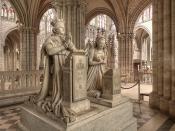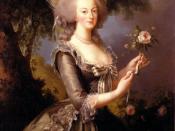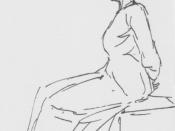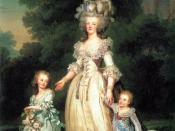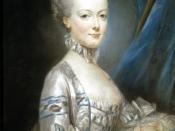Marie-Antoinette-Josephe-Jeanne von Habsburg was born in Vienna, Austria 2 November 1755 to Maria Theresa and Francis I. She was the youngest daughter of sixteen children, her mother being the Archduchess of Austria and queen of Bohemia and Hungary and her father the Emperor of the Holy Roman Empire. In 1770 at the age of fourteen she traveled to France to marry the dauphin prince, Louis-Auguste and later bore him four children. She led an interesting and much publicised life before her execution in 1793. This essay will seek to demonstrate the reasons behind her position as a controversial figure and her political significance. This includes her Austrian background, family, finances, and as a figure of political authority and hence the problems which arose from this position.
When Marie-Antoinette left Austria to become the new dauphine of France, she had to leave nearly everything of her former life behind. She was assigned a new French chaperone/governess whom she despised and stripped of her former Austrian clothes to be replaced with those more suitably French.
Finally her name was changed from the original Maria-Antonia which she was born with to the more acceptable French name of Marie-Antoinette. Although she was a lovely person and admired by many people in society, there remained some degree of wariness towards her because of her Austrian background. In fact, the public came to know her as "l'Autrichienne", meaning simply, the Austrian. It was not intended to be a compliment, instead holding their Queen at a distance from themselves. From the very beginning it was recognised that a new heir was absolutely essential in cementing the future alliance between France and Austria, and with the delays in this the politics were somewhat undecided. Because of her earlier heritage, Marie-Antoinette tended to lean in favour of Austria and their interests as well as those concerning France. Hence she worked towards an amicable Franco-Austrian alliance in order to achieve this. Although it was not in tradition for the Queen to participate in politics, Marie-Antoinette did so with the help of her husband. It was later said, "Resolute where Louis XVI was weak, Marie-Antoinette was encouraged to intervene in French politics, with calamitous results. She advocated strong counter-revolutionary action, but remained with the King even when all was lost".
After marrying Louis in 1770, Marie-Antoinette immediately came under pressure to produce an heir for the French monarchy. While much slander and gossip was spread at the time over why the two could not have children, it was in fact due to Louis suffering from a medical condition preventing this. It was said that he later had an operation for this. Once the couple was crowned King and Queen in 1774, public criticism increased once again and Marie-Antoinette found it extremely difficult to be blamed a problem that wasn't her fault. She wrote to a friend in 1775, "If only I were a mother, I should be considered a Frenchwoman." This initial trouble of having children was important as to how the French people saw her. For it seemed not only did they have an Austrian intruder as a monarch, but also she could not produce the heir they desired. At last however, in December 1778 after eight years of marriage she gave birth to Marie Therese, or 'Madame Royale' as she was known as the eldest daughter of the King. In October 1781 she at last provided an heir to the throne, little Louis Joseph Xavier Francois, although he tragically perished in illness eight years later. In March 1785 she bore a second son called Louis Charles. Interestingly enough though, during this period she suffered at least two miscarriages and had a second daughter, Sophie Helene Beatrix who died shortly before her first birthday. Marie-Antoinette had had a very strict upbringing with her mother back in Austria, and she was determined to be more lenient on her own children. It has been said that. "Marie-Antoinette always conducted herself as a wife (and then a mother) than as a traditional Queen. Against all the principles of the education of royal children, she went so far as to place her daughter under her own tutelageâ¦". She also demonstrated that she wished for her children to be brought up as normally as possible by giving them only a small entourage and ensuring they mixed with 'normal' people, as well as their own. Hence, the children grew up in a happy and safe environment, protected by their mother.
Many of the financial problems of France during the reign of Louis XVI and Marie-Antoinette were attributed to the monarchs. In fact, the blame was more likely to arise from the fact that the country and society was changing drastically over this time. For in the late eighteenth century, and particularly the 1780s, the society tended to be moving away from the original rigid class system of the clergy, nobles and peasants. However, money had the ability to disturb that class system and this can be demonstrated by two well-documented examples. This includes the ability to purchase a seigneurie and the rights associated with it , and the absence of taxes towards the clergy; instead they paid a voluntary donation . Because of these changes the King and Queen had to make a number of changes to combat this, for which they were criticised and widely disliked. It has said that the allegations of the Queens spending were greatly exaggerated, most likely by the nobility who didn't particularly like her because she was changing their privileges and social standing. She did this by making essential reforms and, "â¦rather than ignoring France's growing financial crisis, she reduced the royal household staff, eliminating any unnecessary positions that were based solely on privilege." She was in a difficult position as the French monarchy had always spent large amounts of money on themselves and the estate, and she could not simply do away with the tradition. As well as this, the King adored her in every way and was quite willing and able to spoil her on a regular basis, which did not help matters. For, "When Marie-Antoinette was called to account for her extravagance, her interrogators forgot that it was the King that doubled her allowance unaskedâ¦and who granted pensions and high office to her friends." The new King and Queen were looked upon as a pleasant replacement to the previous monarchs who had ruled, as "France welcomed the youthful couple, who provided a remarkable and refreshing contrast to the lecherous rake and compliant mistresses who had preceded them". She was initially adored by the people for her exuberant nature and sociable personality, however this soon changed to almost mistrust of the 'unknown foreigner' because of her delay in producing the new heir to the throne. Had this factor not arisen, her political reign may have taken on a quite different nature. It was noticed that, "Had Louis and his Queen succeeded in solving the difficulties experienced in the bed chamber at an early stage, Marie-Antoinette may not have become the subject of so much slanderous gossip, as she tried to hide her frustration in a constant whirl of amusement." She entertained herself with a variety of activities, including sleigh racing, opera balls, hunting in the Bois de Boulogne and perhaps even gambling. Much slander was spread about her, one of which being the "Historical Essays on the Life of Marie-Antoinette of Austria, Queen of France to Serve as the Story of This Princess." It was published in 1781 by unknown authors and later widely reproduced at the beginning of the revolution with sixteen documented reprints between 1789-1790 alone. These were circulated among the general French public and within certain court circles, greatly diminishing her reputation by false accusations over affairs with various foreign ministers or courtiers.
In August 1792, Marie-Antoinette was imprisoned for her actions against the country. Although it is debatable what these actually consisted of, people, particularly the Jacobins, accused her of a multitude of crimes. It was said that, "The Queen was accused of a variety of financial and political misdeeds, general hostility to the Republic and the crime of being foreign and therefore ethnically and marginally different. But even more devastating and fatal to her were the accusations of incestâ¦" Growing up in Austria she had experienced a quite different life from those in France, and this worked both for and against her. She was able to bring new ideas with her and was seen as a welcome addition to the monarchy, although this later worked against her. It seemed that the French citizens who had initially adored her were now blaming her for not being the perfect Queen that they dreamed of, however close she came to the ideal. She was a controversial political figure in her day as she dared to work towards goals and ambitions that had not previously been attempted.
